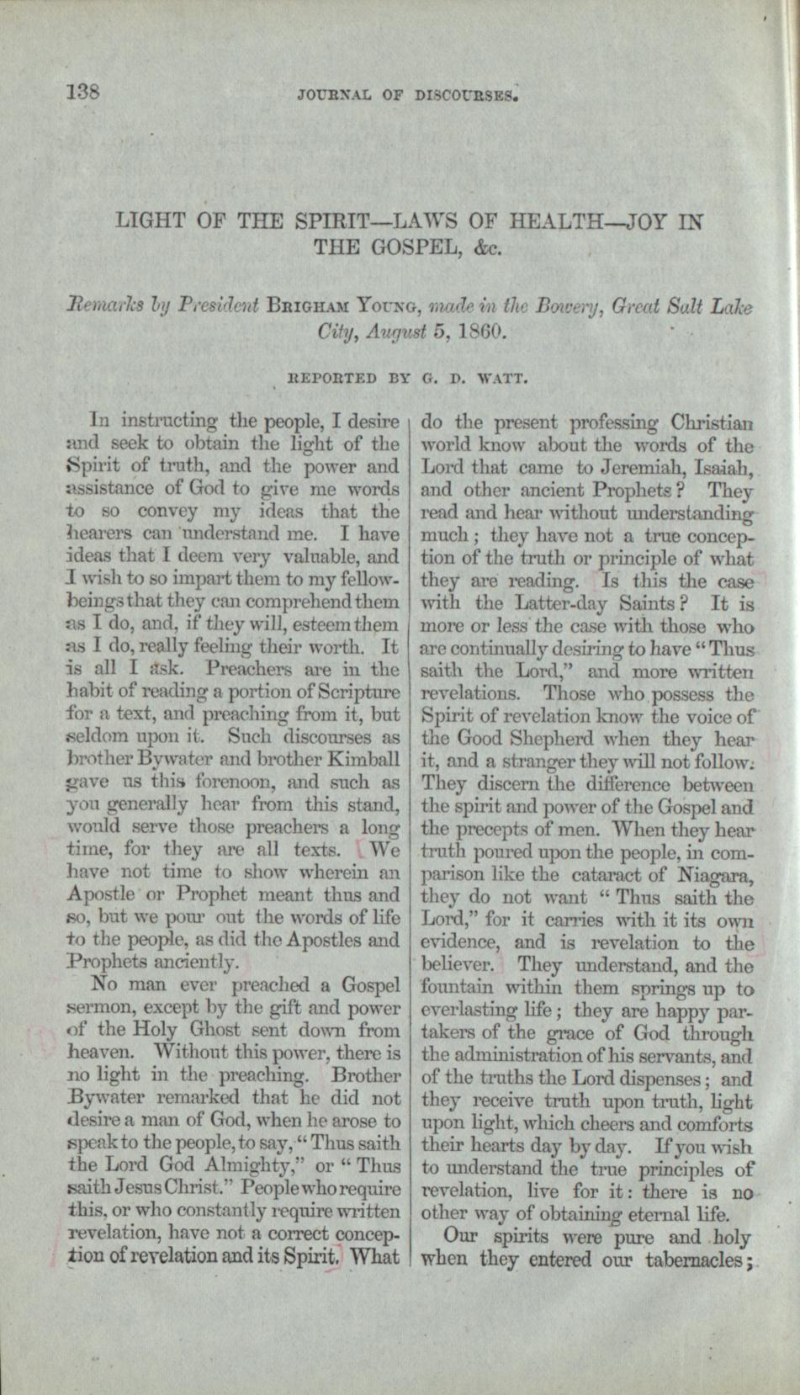Brigham Young corrects belief that a revelation must be prefaced with "Thus Saith the Lord."
- Type
- Speech / Court Transcript
- Hearsay
- Scribed Verbatim
- Reference
Brigham Young, "Light of the Spirit—Laws of Health—Joy in the Gospel, &c.," Journal of Discourses, 26 vols. (Liverpool: George Q. Cannon, 1861), 8:138
- Scribe/Publisher
- George D. Watt
- Audience
- Reading Public, Members of The Church of Jesus Christ of Latter-day Saints
- Transcription
In instructing the people, I desire and seek to obtain the light of the Spirit of truth, and the power and assistance of God to give me words to so convey my ideas that the hearers can understand me. I have ideas that I deem very valuable, and I wish to so impart them to my fellow-beings that they can comprehend them as I do, and, if they will, esteem them as I do, really feeling their worth. It is all I ask. Preachers are in the habit of reading a portion of Scripture for a text, and preaching from it, but seldom upon it. Such discourses as brother Bywater and brother Kimball gave us this forenoon, and such as you generally hear from this stand, would serve those preachers a long time, for they are all texts. We have not time to show wherein an Apostle or Prophet meant thus and so, but we pour out the words of life to the people, as did the Apostles and Prophets anciently.
No man ever preached a Gospel sermon, except by the gift and power of the Holy Ghost sent down from heaven. Without this power, there is no light in the preaching. Brother Bywater remarked that he did not desire a man of God, when he arose to speak to the people, to say, "Thus saith the Lord God Almighty," or "Thus saith Jesus Christ." People who require this, or who constantly require written revelation, have not a correct conception of revelation and its Spirit. What do the present professing Christian world know about the words of the Lord that came to Jeremiah, Isaiah, and other ancient Prophets? They read and hear without understanding much; they have not a true conception of the truth or principle of what they are reading. Is this the case with the Latter-day Saints? It is more or less the case with those who are continually desiring to have "Thus saith the Lord," and more written revelations. Those who possess the Spirit of revelation know the voice of the Good Shepherd when they hear it, and a stranger they will not follow. They discern the difference between the spirit and power of the Gospel and the precepts of men. When they hear truth poured upon the people, in comparison like the cataract of Niagara, they do not want "Thus saith the Lord," for it carries with it its own evidence, and is revelation to the believer. They understand, and the fountain within them springs up to everlasting life; they are happy partakers of the peace of God through the administration of his servants, and of the truths the Lord dispenses; and they receive truth upon truth, light upon light, which cheers and comforts their hearts day by day. If you wish to understand the true principles of revelation, live for it: there is no other way of obtaining eternal life.
- Citations in Mormonr Qnas
The B. H. Roberts Foundation is not owned by, operated by, or affiliated with the Church of Jesus Christ of Latter-day Saints.

